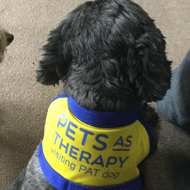
Teddy helped wake owner from a coma
A rescue dog credited with helping to wake his owner from a coma has become a Pets as Therapy dog.
Staff at Southampton General Hospital were amazed when five-year-old Teddy appeared to help wake his owner Andy Szasz from a medically-induced coma just over a year ago.
Andy was taken into intensive care with pneumonia after overcoming bowel cancer and placed into a coma. His wife Estelle sought permission to bring Teddy to the hospital and she believes his barking encouraged Andy to wake three days earlier than expected.
Teddy, who was adopted from the RSPCA, continued to make regular visits and video calls as Andy recovered.
Andy said: “Ted is such a remarkable little dog in many ways. He's clever, loving, loyal, funny and a right little character! He really stole my heart when we first met.
“I always tell people I rescued Ted and Ted rescued me. We certainly do have a special bond.”
The little dog has since scooped the RSPCA’s special animal award at its 2017 honours.
Now, Teddy will help other people at the hospital that saved his owner’s life, through the charity Pets as Therapy, which provides a visit service to hospitals, hospices, care homes and schools.
Andy and Teddy made their first visit to the hospital just before Christmas. Andy said: “It was amazing to see the smiles on so many peoples’ faces. Not only the patients, but the nurses, the doctors and visitors alike.
“Ted was in his element, his little tail non-stop wagging and was unphased by anything, as usual! It was such a rewarding day for us both, and so amazing to see the affect animals have on people.
“I’m so proud of my little boy. It was my wish to make Ted a PAT dog to repay the wonderful work the charity does in cheering up patients and the fantastic hospital staff. And Teddy just loves all the cuddles he gets!
“It’s amazing how animals affect our lives.”
Image © RSPCA



 The Veterinary Medicines Directorate (VMD) is inviting applications from veterinary students to attend a one-week extramural studies (EMS) placement in July 2026.
The Veterinary Medicines Directorate (VMD) is inviting applications from veterinary students to attend a one-week extramural studies (EMS) placement in July 2026.